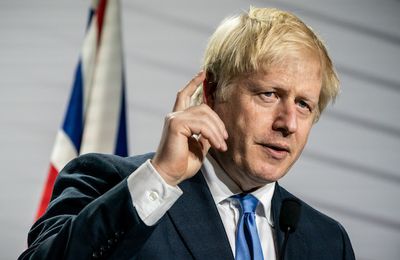As MPs were getting ready for Tuesday’s welfare debate, two of the BBC’s seasoned Westminster watchers discussed the potential penalties for the rebels. “Normally if you’re a backbencher and you vote against the government,” said Sarah Montague on the BBC’s World at One, “you might have the whip removed.” She asked Chris Mason why that didn’t look likely to happen this time: “because of scale”, he explained.
The two journalists were describing an expulsion-based model of discipline. To “lose the whip” is to be booted out of the parliamentary party, and then forced to compete with your former party when the election comes. They were accurately capturing the warped way our party system has been working since Boris Johnson’s notorious mass purge of 21 pro-European wets in 2019. What Montague and Mason didn’t acknowledge is that this is a total travesty of the traditional system.
Awkward backbenchers have always understood that picking a fight with their own government comes at a cost. Rebels could (mostly) forget early promotion, and might well languish in a dingier office than their more pliable colleagues. But as long as they stayed loyal on confidence votes that could kill the government, they didn’t have to fear their own political death.
Margaret Thatcher’s 1986 shops bill popped up in the news ahead of the potentially dicey welfare debate as the last time the Commons had voted against proposed government legislation on second reading. There was no mass expulsion of the traditionalist Tories who objected to liberalised Sunday trading. Indeed, despite Thatcher’s authoritarian persona she mostly understood the need to work within a broad Conservative tent. The last chief whip she appointed, Tim Renton, described his role in almost pastoral terms: “a good whip is not just a sergeant major. He is also a counsellor and a nanny. Giving tea to some and gin and tonic to others, the Chief Whip has an overall responsibility for the health and sanity of his flock.”
There was more brinkmanship under the gentle-natured John Major, whose shrunken majority was vulnerable to anti-European zealots. They threatened to sink the Maastricht Treaty, and with it the central thrust of his government’s foreign and economic policy. Major did turn one vote into a confidence question, while some of the rebels toyed with felling the government. In the end, eight were suspended, including Teddy Taylor and Teresa Gorman. The fact both were back as Conservatives in the subsequent parliament illustrates that this was temporary crisis management, rather than a permanent purge.
There was no systematic exclusion of rebels under Tony Blair. In his first term, dozens of them—including Tony Benn and Jeremy Corbyn—voted against welfare cuts without ceasing to sit as Labour MPs. In his second, a record 139 Labour MPs parted company with the government on Iraq, but there was no general drive for expulsions. Yes, George Galloway was given the boot (and also expelled from the Labour party). But he was deemed to have split with Labour by urging some electors to vote against it, and to have advocated for literal insurrection by British troops, and thereby to have brought the party into “disrepute”. That term is the traditional benchmark for whip withdrawal, although it is normally more about personal misconduct than political positioning.
So, Boris Johnson’s sectarian purge was something new and alien. One might have expected the opposition to denounce it as such. But to Keir Starmer’s political machine—which took charge of Labour the following year—it looked less like a problem than an inspiration. For that machine saw its central task as drawing a line under Jeremy Corbyn’s defeated leadership and marginalising anyone loyal to him. The most eye-catching move was, in 2020, removing the whip from Corbyn himself. The more significant was probably the centre’s controversial meddling in various parliamentary selections. Actual and threatened suspensions of other sitting MPs—including for trenchantly pro-Palestinian rhetoric—was another instrument of control.
Almost the moment the election was won, seven MPs were suspended for defying the whip to vote for abolition of the two-child limit. Admittedly, this was tabled in a controversial way, as an amendment to the Queen’s Speech. But it is striking that three of those MPs remain subject to a suspension that was triggered by supporting something that it has recently been briefed is a “personal priority” for the prime minister.
In the run-up to this week’s welfare vote, it was reported that the PM had to be told that it was politically impossible to suspend the entire rebel cohort of more than 100 MPs. And there were whispers—albeit contested—that some in No 10 were toying with expelling 10 anti-cuts MPs every hour for five hours, until the rest were cowed. Now that Starmer has signalled that he is instead grateful to Labour colleagues for a fruitful dialogue which has ensured that his welfare reforms are consistent with “Labour values”, his aides must—surely and finally—realise that their brittle control has cracked.
Simple self-interest may well now lead our politicians back towards pre-Johnson tolerance. None of our political parties have the sort of deep social roots they used to. They need to encompass a broader, not narrower, range of opinion. This is true in spades for Labour. Its landslide in parliament is a quirk that the electoral system produced from a strikingly narrow vote share: Labour cannot afford to narrow even further.
But expulsion-happy leaders and whips should also give thought to the health of our democracy. In the United States, Donald Trump has reinvented the Republican party, which once contained a mix of outlooks, as a personality cult. Senators and congressmen are terrified to step out of line for fear of a Trumpian primary challenge. To see the result, just think of the abject mess of the president’s capricious tariffs. Congress could theoretically intervene, but the warped power of party over the Republican majority ensures that the celebrated checks and balances of the US constitution provide no check at all.
If Britain doesn’t want to end up in that sort of mess, it needs broad parties—parties where the threshold for exclusion is disrepute, not mere disagreement.














